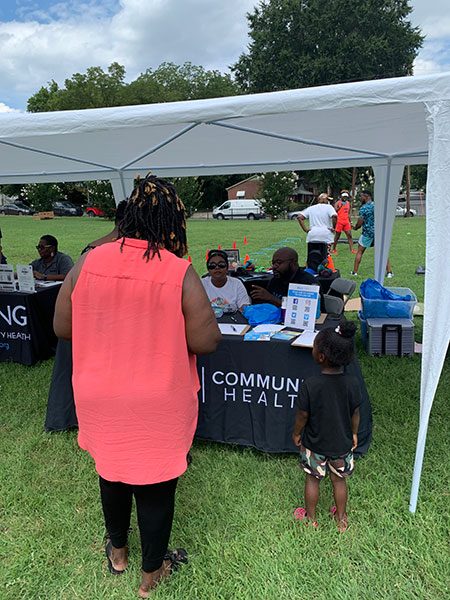Barbershop Talk Provides Forum for Young Black Men in Charlotte: RAO Community Health
“Burnout is real.” That is what Julian Graves with CDC partner organization RAO Community Health (RAO) in Charlotte, North Carolina says about the challenges of COVID-19 communication two-and-a-half years into the pandemic.
As COVID-19 and Seasonal Flu Coordinator, Graves and his colleagues at RAO wanted to provide a unique forum for young Black men to speak about the pandemic and the issues they face. Ashley Carmenia is RAO’s Health Equity Director, and she tells her team to “get creative – don’t be afraid to think outside of the box because conventionalism isn’t going to get you anywhere.”
So, what did the team come up with? A barbershop talk. Barbershops hold a special place in the Black community. They are a long-standing community hub seen as a safe place for raw, honest conversation – including health discussions – while getting a haircut.
The barbershop talk provided a platform for four young influential Black men living and working in the Charlotte area. Graves moderated the barbershop talk, which lasted 44 minutes. During that time the men discussed COVID-19 and its effects on the Black community.
There were some definite takeaways from the conversation. The men didn’t know what to think about the pandemic at first, but soon they understood the severity of COVID-19 when family members got sick. The speakers also talked about the importance of going to the doctor for regular checkups. One man, a radio host, says “when Black fathers don’t go to the doctor, it affects their kids,” adding “what they see is what they’ll be.” You can experience this compelling conversation in a video of the barbershop talk here.
The barbershop chat provided a forum for candid conversation about health issues that affect the Black community. Many Black men do not trust government health messages. Hearing from trusted messengers in their communities can help persuade them to get vaccinated and to see a doctor for routine checkups. Carmenia says it is important to work with trusted messengers because “doctors and nurses don’t have 2-to-3 hours to sit with people and talk to them about their concerns, so it’s important to get out in the community and listen.”
The barbershop talk video was released in mid-May and was distributed on RAO’s website, Vimeo channel, Twitter, and Instagram accounts. Its success led Carmenia to host a conversation with four influential black women in a Charlotte area gym which will be available on RAO’s website later this year.

RAO strives to tie in much of its CDC-funded Racial and Ethnic Approaches to Community Health (REACH) work into efforts to increase vaccine confidence, as well as educating community members on good habits to improve their overall health. RAO hopes the barbershop talk and future communication campaigns can help address barriers to vaccine administration and enable a more holistic and equitable approach to health care.
Read more about the work of RAO to serve the community of Charlotte, North Carolina on the Partnering for Vaccine Equity "Stories from the Field" page.
Federal funding for this project is supported through cooperative agreement 1 NH23IP922652-01-00 from the Centers for Disease Control and Prevention (CDC) of the U.S. Department of Health and Human Services (HHS) totaling $25,660,048 with 100 percent funding from CDC/HHS. The contents are those of the author(s) and do not necessarily represent the official views of, nor an endorsement, by CDC/HHS, or the U.S. Government.
